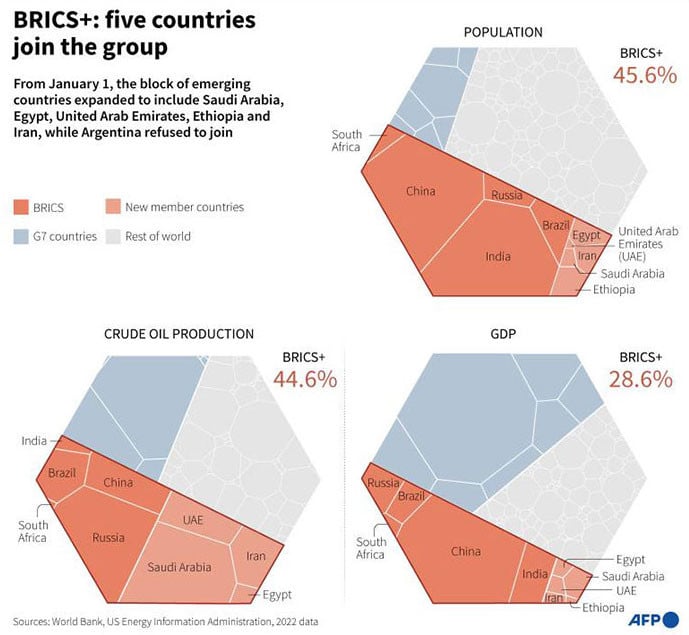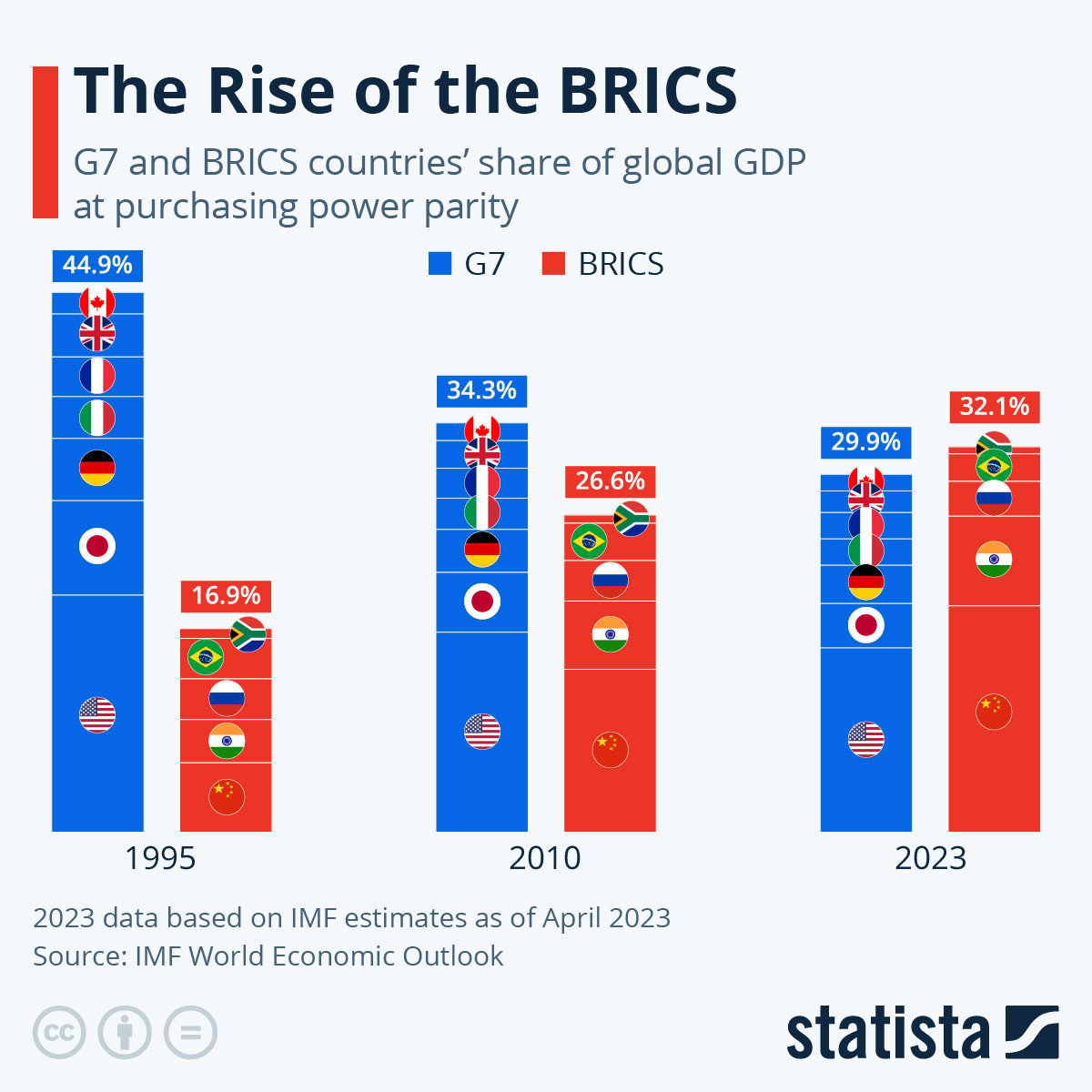The southwestern Russian city of Kazan is all set to host the 16th summit of BRICS, an emerging economic bloc founded by Brazil, Russia, India, China, and South Africa. Russian presidential aide Yury Ushakov has said that 32 countries have confirmed their participation in the meeting, scheduled to be held from Oct 22 to 24. Of them, 24 states will be represented by their heads and eight by their senior officials.
The summit’s theme, “strengthening multilateralism for just global development and security,” evinces the growing alienation of the Global South with the US-led international political and financial systems that purportedly protect and promote the ‘exorbitant privileges’ enjoyed by Western nations in a unipolar world.
The Kazan summit is garnering special attention because participants would formally embrace four new members: Egypt, Ethiopia, Iran, and the United Arab Emirates. Saudi Arabia, which has also been invited, is yet to decide on joining. The summiteers will also consider applications of another 34 states that are seeking either a full membership or cooperation in some other forms. Notable among them are NATO ally Turkiye, Pakistan, Kazakhstan, Indonesia, Thailand, Venezuela, Cuba, and Nigeria.

Counterweight to the West?
The growing allure of BRICS is concerning for the West due to the huge collective economic potential of its member states. The nine BRICS nations make up 28.3% of the world’s land area and 44.6% of its population. In 2023, their combined GDP was $29 trillion, representing 27.4% of the global economy. In comparison, the Group of Seven (G7), which includes the world’s largest developed economies — France, Germany, Italy, Japan, the US, the UK, and Canada — has a collective GDP of $45.92 trillion, accounting for 43% of the global economy.
However, when adjusted for purchasing power parity, BRICS’s GDP goes beyond $65.7 trillion, or 35.43% of the world’s GDP, while G7's GDP drops to $55.02 trillion, or 29.63% of the global economy. Russian President Vladimir Putin recently said that the BRICS nations are “the drivers of the global economic growth. It is within BRICS that the main increase in global GDP will be generated in the foreseeable future.”
More importantly, the BRICS Plus nations are now collectively in a dominant position in terms of raw material reserves. With Iran and the UAE on board and Saudi Arabia in the queue, BRICS would account for 43% of global oil production and a huge share of global oil deposits. Similarly, almost 40% of reserves of the rare earth required for manufacturing batteries for electric vehicles, power storage systems, and microelectronics are in China’s control.
Talking shop?
Critics argue that BRICS has struggled to harness the economic potential of its members, as it couldn’t offer viable systemic alternatives to the West-dominated financial and political systems. This criticism may hold true but supporters contend that BRICS is work in progress as international alliances and groupings often operate at a slow pace. Nonetheless BRICS has made some modest achievements in a short span of time. Of these, the most significant is the creation of the New Development Bank, or “BRICS bank”, a multilateral development bank with $50 billion in subscribed capital to finance infrastructure and climate-related projects in developing countries.
Since its inception in 2015, the bank has disbursed more than $30 billion in loans so far. BRICS foreign ministers agreed earlier this year to develop the NDB into a new type of Multilateral Development Bank of the 21st century. The bloc has also set up a $100 billion Contingency Reserve Arrangement, a foreign currency liquidity designed to support its members during global financial crises.
In 2022, member states agreed to establish the BRICS Agriculture and Rural Development Forum, an annual mechanism aimed at tackling critical issues related to poverty reduction and food security. The bloc is also developing a range of platforms – including communications channels, technological and educational standards, financial systems, payment instruments and mechanisms – for sustainable investments.
Wang Lei, the director of the BRICS Cooperation Center at Beijing Normal University, has a different perspective on BRICS accomplishments. He argues that the “three wheels of economy and trade, political security, and people-to-people exchanges” have been driving BRICS cooperation. In that, the bloc has brought both functional and tangible benefits to its member states by providing an information-sharing platform and offering a forum focusing on issues of mutual interest like the economy, national security, and public health.
What to expect?
The 15th summit in Sandton, South Africa, was a crucial turning point in the BRICS trajectory in two ways: a transition from BRICS to BRICS Plus and an expression of its members’ pent-up frustration with the Global North. The summit expressed concerns over the West’s dominance in global financial and political institutions, as well as its resistance to reforms. Participants also criticised what they called protectionist trade practices, the West’s role in international conflicts and wars, the unilateral imposition of sanctions on nations that refuse to align with its worldview, the misuse of global payment systems like SWIFT, and the disregard for food security and health needs in the Global South during pandemics.
In their joint statement, “Johannesburg II Declaration”, the BRICS leaders reaffirmed their commitment to “inclusive multilateralism” and respect for international law; called for enhancing global governance by promoting a more representative, democratic, and accountable international and multilateral system; sought greater representation of emerging markets in international organisations; supported an open, transparent and rules-based multilateral trading system with the World Trade Organisation at its core; and reiterated support for a robust Global Financial Safety Net with a quota-based International Monetary Fund (IMF) at its centre.
At the 16th BRICS summit, Russia is said to be pushing for an alternative global payments platform for trade transactions that would be immune to Western sanctions. This system will be based on a network of commercial banks connected to each other through the BRICS central banks, according to a Reuters report. It would use blockchain technology to store and transfer digital tokens backed by national currencies. This, in turn, would allow those currencies to be easily and securely exchanged, bypassing the need for dollar transactions. Currently, the ‘king dollar’ rules over the financial world as more than 60% of international currency reserves are invested in US dollars. Critics argue that the United States, with its Western allies in tow, has frequently weaponised the dollar for “economic warfare” against countries that defy or refuse to align their geopolitical interests with the West.
Many countries, especially those in the Global South, have long been vocally critical of the ‘weaponisation of dollar’ and harboured a desire to get around the greenback in order to de-risk their international financial transactions. However, the desire to de-dollarise was further motivated by the seizure of $300 billion Russian Central Bank assets by the US and its European allies to punish Moscow for its 2022 Ukraine invasion and the more recent EU decision to transfer to Ukraine billions of dollars earned in profit by the immobilisedRussian assets. Moscow has called this move a ‘theft’ that violates international law and further undermines global trust in the Western financial system. The unilateral Western punitive action triggered fears among countries that the same could happen to them if they ever defy the West.
Within BRICS there have been growing calls for a “common currency” for trade among member nations to mitigate vulnerabilities to Western sanctions. However, economists argue that given the heterogeneous nature of BRICS, the common currency idea may not be coming to fruition anytime soon because it would “require years, if not decades, of preparation, harmonisation of central banks’ policies and an agreement between states to replace their sovereign currencies with a new, common legal tender.”
Some reports suggest that a common BRICS currency will not be a currency per se. It will be based on gold and the basket of BRICS sovereign currencies, such as Brazilian real, Russian ruble, Indian rupee, Chinese yuan, and South African rand, with a ratio of 40% to 60%. A common currency may not be on the agenda of the Kazan summit, but until a consensus is reached, the bloc will be pushing for an enhanced use of local currencies for trade between member states, shifting away from the dollar.

Binary confrontation
Initially dismissed as merely a talking shop, BRICS is now viewed by the US and its allies as a growing geopolitical threat. This fear stems from the refusal of BRICS members to reshape themselves in the Western image and instead pursue their preferred models for political, social, and economic development. In geopolitics, the US approach has always been that of binary confrontation perfectly exemplified by a recent blunt statement of Secretary of State Anthony Blinken who said at the 2024 Munich Security Conference: “If you’re not at the table in the international system, you’re going to be on the menu.” This approach of “Us vs Them”, “East vs West”, “West vs the Rest”, and “Global North vs Global South” shows a zero-sum mentality, leaving no room for sovereign choices.
The US wariness of BRICS expansion is driven primarily by its China-fixation because it fears Beijing might be using the bloc to offset America’s global influence and ultimately challenge the liberal world order. BRICS leaders, however, claim their club doesn’t aim to counter anyone as they only seek economic sovereignty and sustainable development immune to arm-twisting and coercion. The twofold increase in the number of BRICS members – with more hopefuls waiting in a queue – indicates growing discontent with the international political and financial systems, which, many believe, protect the geopolitical interests of the “developed few” with scant regard for the “developing majority.” In BRICS, on the other hand, they see a more democratic, sympathetic, and inclusive alternative in which they don’t have to compromise on their political, social and economic sovereignty. The bloc’s rapid expansion is a wake-up for the US to embrace a more equitable global governance system by giving up opposition to democratisation of institutions like the UN Security Council and IMF, accepting multipolarity as the new reality, and shunning zero-sum mentality and unilateralism. Or else, it may risk even close allies drifting away for alternatives. Turkiye is a good case in point.
